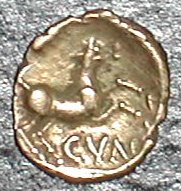 |
 |
8,400 fine for flouting newt law: |
| Author | Message |
|
badgerboy Member Joined: 15 Dec 2006 No. of posts: 8 View other posts by badgerboy |
Posted: 29 Jan 2007 Hi all Just to make you aware (if you were not already) of a recent GCN conviction in Leicestershire. All credit to the WCO who investigated and the CPS for running it. This is surely the largest penalty yet for a GCN offence in the UK? ˙8,400 FINE FOR FLOUTING NEWT LAW
A BUILDER has been fined ˙8,400 for damaging the habitat of great crested newts.
Gerald McHugh, of King Street, Seagrave, admitted damaging or destroying a place used by the protected creatures, between March 2005 and June 2006 and damaging or destroying a breeding site or resting place used by them. He also admitted the same charges on behalf of his company, McHugh Construction Ltd, when he appeared at Melton Magistrates' Court on Thursday. The court was told some land in King Street, Nether Broughton, which included a paddock and pond, was bought for development in 2004. Neighbour Karen Shipside told McHugh (52) numerous times about the presence of great crested newts at the site. He was visited by a County Hall ecologist, police wildlife officer Neil Hughes and a newt expert who advised him about the presence of newts in the pond. Sue Lawley, prosecuting, said: "The defendant was advised he should see an ecology survey before any work was carried out on the pond or paddock. "The survey revealed adult great crested newts and eggs and he was advised not to carry out work until he had obtained a licence from the Department for Environment, Food and Rural Affairs." But when officials revisited the site they saw work had been carried out which would have affected the newts. She added: "The pond water was black and foul smelling and there was no presence of newts. The pond was little more than a hole in the ground. No licence was issued to allow work to be carried out." Mr Patel, defending, said a survey revealed only four newts in the pond. And when it came to light newts were present, McHugh fenced it off. Mr Patel said: "He wasn't aware of conservation regulations though ignorance is clearly no defence. He was unaware if he moved some soil there could be some newts in it." Mr Patel said most of a hedge was removed before McHugh came on site. "Some was left near the pond. He didn't appreciate it was a habitat. He removed it and put some new hedging in." Mr Patel added McHugh had been advised by council officials a fallen fruit tree at the site should be coppiced. "This is not a man who could see frogs and tadpoles jumping out of the pond and thought to hell with this I'm going to fill it in." However, magistrates' chairman David Penny said: "We consider this was intentional rather than wreckless. There was acceptable evidence of great crested newts on that site and that you and your company worked to damage the environment over a period of time. "The removal of the hedge and tree was contrary to the council's coppice order." McHugh was personally fined ˙1,400 for the offences and his firm ˙7,000. An order was also made for ˙70 costs. Speaking afterwards police wildlife officer Neil Hughes said: "It shows magistrates will treat seriously and deal effectively with people who flout conservation laws. I hope this will send out a message to others to comply with legislation to conserve our wildlife." Great crested newt numbers have plummeted across Europe over the last century, with an estimated 40,000 breeding pond losses in Britain during the 1960s to 1990s alone. Such declines are largely due to loss of ponds and surrounding habitat through agricultural intensification in the countryside, but residential, industrial and commercial development around towns and inappropriate management of ponds has also played a part. A similar pattern of decline is happening throughout the European range of the species, with England emerging as one of the strongholds for great crested newts. As a result, the newts and the places they use for breeding, resting, shelter and protection are safeguarded under UK and European law. Badgerboy |
|
james4 Senior Member Joined: 13 Nov 2006 No. of posts: 466  View other posts by james4 |
Posted: 04 Feb 2007 good,im glad they do good fines so stop people. http://ukreptiles.proboards55.com |
|
adamanteus Senior Member Joined: 03 Jun 2008 No. of posts: 66  View other posts by adamanteus |
Posted: 06 Jun 2008 Okay, I know this is a pretty old thread, but I'm new to the forum (and I have some time to kill) so I've been reading through a lot of older threads. I have spent most of my working life in the construction industry, and I think the penalty McHugh had to pay was trivial. He was most likely laughing up his sleeve. Construction work is run on extremely tight schedules, and every day lost is money lost. The delays involved with dealing with his newt 'problem' correctly would have cost him many times more than the insignificant fine that was imposed. If he knew that GCNs were present, he would have just costed a few grand into his price to cover small fines. Until significant penalties and 'user friendly' alternatives are in place, the McHughs of this world will continue to do what they do. James. |
|
GemmaJF Admin Group Joined: 25 Jan 2003 No. of posts: 2090 View other posts by GemmaJF |
Posted: 06 Jun 2008 Being one of those that 'sleeps with enemy', totally agreed James, lets look it in terms as a fine that was less than the potential fine for killing two animals, cheaper than a 6 week delay, cheaper than a 6 day delay - the developer won. Not a suprise when blatant abuse of the law is usually let off due to poor support from those on the ground and incompetence from those we trust to know what is going on - lots of coughing and nothing more to say.... other than what is an ˙8,400 fine compared to the bill for a mitigation, trivial, in real terms about 10% to 5% of the cost so it sounds like the developer won in every way.. Gemma Fairchild, Independent Ecological Consultant |
|
AGILIS Senior Member Joined: 27 Feb 2007 No. of posts: 694  View other posts by AGILIS |
Posted: 07 Jun 2008  PITY THEY DONT FINE GOLF CLUBS FOR DESTROYING SAND LIZARD HABITAT SAME AS THEY DO FOR NEWTS BUT AS YOU STATED GEMMA ITS A BIT LATE WHEN THE DAMAGE IS DONE PITY THEY DONT FINE GOLF CLUBS FOR DESTROYING SAND LIZARD HABITAT SAME AS THEY DO FOR NEWTS BUT AS YOU STATED GEMMA ITS A BIT LATE WHEN THE DAMAGE IS DONE KEITH KEITH
LOCAL ICYNICAL CELTIC ECO WARRIOR AND FAILED DRUID |
|
will Senior Member Joined: 27 Feb 2007 No. of posts: 330 View other posts by will |
Posted: 07 Jun 2008 It's always going to make sense from a financial point of view for a developer to kill protected newts. lizards etc. The reason the big boys generally don't is because of the negative publicity. Unfortunately small to medium developers don't care about their profile so much, and I've personally been involved in several attempts to get them prosecuted but even with direct evidence of persecution CPS only slaps their wrists. Basically the legislation works (if at all) as a deterrent, and then only to reputable developers. |
|
timbadger Member Joined: 15 Dec 2005 No. of posts: 19 View other posts by timbadger |
Posted: 21 Jul 2008 I have always wondered why you rarely - if ever see larger companies taken to court for 'wildlife offences'. Im sad to say that i dont think it is because they are less likely to impact protected species negatively, nor that they employ good people and therefore are 'covered' through that. As mentioned in the thread the negative publicity does seem to be a possible deterent, but one wonders if it just means more closed doors rather than actual well done mitigation. As has been covered here the sums are trivial - and the timing is usually after the event and the development. Perhapse if offences could be brought to attention quicker then the developer might be more likely to incur both the fine and the 'down' time on the project...?
|
|
badgerboy Member Joined: 15 Dec 2006 No. of posts: 8 View other posts by badgerboy |
Posted: 27 Aug 2008 In relation to larger companies not getting taken to Court I understand that EDF Energy are appearing at Harlow (Essex) Magistrates Court in relation to GCN offences. Badgerboy |
|
badgerboy Member Joined: 15 Dec 2006 No. of posts: 8 View other posts by badgerboy |
Posted: 27 Aug 2008 There is also this from: http://www.naturalengland.org.uk/press/releases2007/210607.h tm " Housing Developer fined for damaging great crested newt habitatTaylor Woodrow Developments Limited based in Solihull, were fined ˙2,000 with ˙87 costs after pleading guilty to damaging or destroying a resting place of great crested newts at a development site in Stansted Mountfitchet, Essex following a hearing at Harlow Magistrates Court yesterday (20 June). The company were aware of the legally protected newts on their site and had been granted a licence by Natural England to enable ecologists to capture the newts to allow the development to go ahead. The captured newts were placed in a temporary reserve while new ponds were being created for them nearby. Once the ponds were suitable for the newts to live in they, and the temporary reserve, were to be joined to form a larger reserve. However, in December 2006 a manager from the company instructed contractors to excavate the new ponds. The contractors drove machinery over special fencing which protected the newt reserve and placed soil from the excavation on top of where the newts had been released. Wildlife Management Advisers from Natural England and PC Andrew Long, the Force Wildlife Crime Officer for Essex Police, visited the site after being informed by an ecologist working for the company. The visit confirmed a breach of the law and led to yesterdayĂs case. Paul Cantwell, Wildlife Management Adviser with Natural England, said: ˘This case highlights why developers must take extra care when dealing with their contractors who are working where there are protected species. I believe this situation was completely avoidable. I would like to commend PC Long and the Crown Prosecution Service for bringing this case to Court.÷ PC Andrew Long, the Wildlife Crime Co-ordinator for Essex Police said: "This case demonstrates that Essex Police, working with agencies such as Natural England can have a positive impact on wildlife crime. Essex Police will, where possible, investigate matters of wildlife crime, and if there is sufficient evidence refer the matter to the Crown Prosecution Service.÷ Notes for editors: 1. Natural England works for people, places and nature to conserve and enhance biodiversity, landscapes and wildlife in rural, urban, coastal and marine areas. We conserve and enhance the natural environment for its intrinsic value, the wellbeing and enjoyment of people, and the economic prosperity it brings. 2. The offence prosecuted was the damage or destruction of a breeding site or resting place of a European protected species under Section 39(1) of The Conservation (Natural Habitats, &c.) Regulations 1994 (as amended). 3. Great crested newts and their habitat are protected by the Wildlife and Countryside Act 1981 (as amended) and the Conservation (Natural Habitats, &c.) Regulations 1994 (as amended). They breed in ponds but spend much of their lives on land, sometimes venturing several hundred metres from the pond. They often depend on several ponds close together, linked by suitable land habitats. Great crested newts are found in rural, suburban and urban areas. A licence is required to undertake actions affecting great crested newts which would normally be prohibited by law (such as capturing newts, or filling in their breeding ponds). 4. Information on protected species licensing and the law regarding protected species in England can be found on the Natural England internet site. For further information contact: Natural EnglandĂs Press Office on 0845 603 9953, press@naturalengland.org.uk." Badgerboy |
|
AndyS Senior Member Joined: 26 Aug 2007 No. of posts: 95 View other posts by AndyS |
Posted: 27 Aug 2008 Just as wishful thinking really, maybe when ever a developer does damage or destroy GCN (or any other species) Development is halted for say 3-5 years to allow the species affected to get a foot hold it would certainly make developers think before flouting the Law.
I'm sure I'd make a good Judge in these case's |
|
badgerboy Member Joined: 15 Dec 2006 No. of posts: 8 View other posts by badgerboy |
Posted: 28 Aug 2008 Andy
Although I understand its just your wishful thinking, the law currently does not allow for your proposal to go ahead. Even if it did, the site would likely having full planning consent and a licence would already have been issued or be applied for from NE so bottom line is that the site would be developed in time. Why then wait until it had become a much better habitiat before effectively destroying it again? Much better to argue the case for an increase to the maximum sentence which is currently ˙5000 and or six months in prison. So even if you were the judge, you would be limited to three zeros at the end of anything and would have to take in to account early guilty pleas etc. Badgerboy |
|
badgerboy Member Joined: 15 Dec 2006 No. of posts: 8 View other posts by badgerboy |
Posted: 18 Mar 2010 Another prosecution. NE press release: Construction company fined for damaging resting place of newts 8 March 2010 On 8 March 2010 at Lowestoft Magistrates Court, Barnes Construction Limited of Ransomes Europark, Ipswich, was fined ?700 with ?200 costs and a victim surcharge of ?15 after pleading guilty to damaging or destroying a resting place of great crested newts at the construction site for a new Travelodge in Leisureway, Lowestoft. The owners of the land at Potters Kiln had employed professional consultant ecologists to do a wildlife survey and apply to Natural England for a licence to trap and move any great crested newts to a new reserve set up specially to take them on land immeadiately adjoining the site. This land is now owned and managed by the Suffolk Wildlife Trust. As part of the licenced trapping programme, a special amphibian-proof fence was erected around the entire site to help catch the newts but also to prevent them from returning to the site once they had been transferred to the adjacent site. Natural England officers visited the site on 23 May 2008 following a complaint to find that the fence had been removed in some areas and damaged in others. This would allow newts to re-entre the site and potentially be killed or injured by the construction work which had already started on the site. The company pleaded guilty to damaging or destroying a resting place of great crested newts under Regulation 39 (1) (d) of the Conservation (Natural habitats, &c) Regulations 1994. Following the verdict, Natural England Wildlife Enforncement Specialist Paul Cantwell, said: "This case highlights the need for construction companies to comply with the law in relation to protected species. In this particular case, the defendant failed to ask any questions of the site owner in relation to protected species and failed to ascertain the purpose of the amphibian fencing. Had it done so, they may not have ended up with a criminal conviction today. The aggravating feature in this case was that they were told by the Suffolk Wildlife Trust, the landowner's ecologist, the Poilce and Natural England to stop works because of the risk to newts but failed to heed these warnings and carried on." A spokesperson for Suffolk Wildlife Trust added: "We are pleased that the law protecting great crested newts, which are protected at both a national and European level, has been proven to work. Great crested newts are legally protected from trade, transport, possession, capture, injury, killing or disturbance. Their habitat also receives protection from disturbance." Badgerboy |
|
ben rigsby Senior Member Joined: 27 Apr 2010 No. of posts: 337 View other posts by ben rigsby |
Posted: 12 May 2010 hi all, depressing this. the defences case is pitiful and its clear that future fines were assimilated into not-quite bob the builders costings. the "this is not a man who..." speech is nauseating and so unconvincing as to be laughable if the joke wasnt on us. so is the attempt to paint black white. angel McHugh my foot. he knew what he was doing. i didnt know tadpoles could jump OUT of water either. ill look out for that. thanks herp barrister! im sure everyone agrees penalties are way too low and presently NO DETERRENT. dig a pond and apply pressure. we need more weapons. ben Diversity. |
|
Suzi Senior Member Joined: 06 Apr 2005 No. of posts: 860 View other posts by Suzi |
Posted: 13 May 2010 Whilst it is all very laudable to prosecute these people I think that as big, or bigger, a villains are local councils, reserve managers, wildlife maintenance organisations etc. They are gradually chipping away at our wildlife by their misguided actions. I could quote you examples, but then everyone on here could! Suz |
- 8,400 fine for flouting newt law |